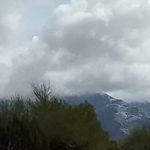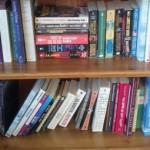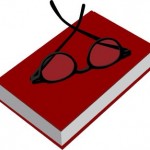Whew! February is drawing to a close. Here in Tucson, it’s actually been winter for a few days this month. I even took a photo of some snow—from far away. Look for the little white blur.
When March blows in later this week, it brings good things to Tucson. Authors, books, readers, music, oh boy. The Tucson Festival of Books is March 10 and 11 and it promises to be a treat. Because after all, what’s more fun than books? The Festival includes poets (Billy Collins, the most popular poet in the U.S.), journalists, storytellers, humorists, memoirists, adventure writers, writers of mystery and kid lit and cookbooks and science books, and so many more. Even a free performance by the Rock Bottom Remainders! (Authors who formed a band, who play and sing pretty dang good rock music.) I’ll be there, signing books and talking mysteries, at booths sponsored by Sisters in Crime and Arizona Mystery Writers. But mostly, I’ll be absorbing the smells, sights, sounds and buzz of lots of people who love words.
I’ve discovered, however, that some folks have difficulty distinguishing between all the different forms of the written word. On a plane ride sometime back, I chatted with a pleasant young man, a recent college graduate who works in sports management. He suggested I write a non-fictional biographic novel about a sports figure we were discussing.
I didn’t correct him, but a novel is a work of fiction. A biography is non-fiction. There’s no such thing as a non-fiction novel. There’s not supposed to be such a thing as a fictional biography, although some authors push the limits.
The term creative nonfiction was coined to describe nonfiction that uses the literary craft to present “factually accurate prose about real people and events in a compelling, vivid manner.” (from the Creative Nonfiction journal). These include essays, biographies and memoirs. Boiling that down, fiction writers get paid to lie and nonfiction writers are supposed to tell the truth. Both aim to draw the reader in with absorbing language and fascinating narrative.
 It irks me when people assert with a deal of pride that they never read fiction. They tell me they’re far too busy, and if they have any spare time for reading, it is allocated to nonfiction in their profession. People who read only professional journals and books are limiting their horizons. The world awaits the reader of fiction. In mystery fiction alone, we can learn about virology, bacteriology, archaeology, other cultures, exotic careers and the fascinating aspects of jobs considered mundane by many. I learned about the life of a sports agent in a series of humorous mystery novels. Most writers of fiction invest a huge amount of time in research, striving to make the factual elements of their novels correct.
It irks me when people assert with a deal of pride that they never read fiction. They tell me they’re far too busy, and if they have any spare time for reading, it is allocated to nonfiction in their profession. People who read only professional journals and books are limiting their horizons. The world awaits the reader of fiction. In mystery fiction alone, we can learn about virology, bacteriology, archaeology, other cultures, exotic careers and the fascinating aspects of jobs considered mundane by many. I learned about the life of a sports agent in a series of humorous mystery novels. Most writers of fiction invest a huge amount of time in research, striving to make the factual elements of their novels correct.
Humorous fiction that makes us laugh out loud can extend our lives. (Really. I read that in an essay written by a physician.)
Trying to solve a puzzling murder along with an amateur sleuth or a crafty private eye can be as sharpening to the mind as solving a crossword puzzle.
 Mystery writers Sara Paretsky, Sue Grafton and Marcia Muller broke the barriers for women private eyes and at the same time helped young women understand that there are few barriers for a determined woman.
Mystery writers Sara Paretsky, Sue Grafton and Marcia Muller broke the barriers for women private eyes and at the same time helped young women understand that there are few barriers for a determined woman.
Reading fiction expands our vocabularies outside our chosen profession, and may even help us become more interesting writers in our own fields. A mind relaxed from exploring a new world in fiction can often be more creative in solving the problems of daily life and work.
What have you learned from fiction? Do you read multiple genres?
To circle back to where I began, if you’re in Tucson this March, check out what locals call “Tee-Fob,” the Tucson Festival of Books (TFOB). If you’ve been, please share what you’ve enjoyed or disliked about it.
Wish I could be in Tucson for TFOB, it sounds like a reader’s blast!
Wish you could, too. Maybe next year!